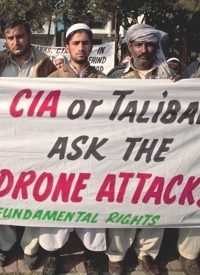
“I have read that Americans are peace-loving,” 58-year-old Pakistani writer Syed Zubair Ashraf told the Washington Post. “But their government has interfered in every country. Why?” That is an excellent question, and one to which Americans ought to give serious consideration, especially as a presidential election approaches. Few Americans would consider themselves warlike. Who among us would choose to drop bombs on a foreign country at his own expense and risk? Yet the U.S. government, claiming to represent the American people, does so routinely — and then blames the inevitable retaliation on foreigners’ hatred of the United States’ liberty, not its government’s foreign policy.
Such “blowback” (as the Central Intelligence Agency, which isn’t so foolish as to believe government propaganda, calls it) may soon be coming from Pakistan. The Post reports that Pakistanis, fed up with U.S. policy and the suicide attacks arising in response to it, have come to “view the United States … as an enemy.” They have good reason to come to that conclusion, says the paper: “Since 2001, when Islamabad partnered with Washington to combat the Taliban and al-Qaeda, there have been 335 suicide bombings in Pakistan. Before 2001, there was one.”
During the last 10 years, over 10,000 Pakistani civilians have been killed, more than a few as a result of U.S. drone strikes. “The bloodshed has traumatized the national psyche, spawning chains of security checkpoints and robbing families of breadwinners and children,” writes the Post. Odds are that some members of those families will seek revenge on the country they blame for their plight.
Indeed, many Pakistanis believe that U.S. policies are the cause of their distress. Ashraf, who lost a daughter to a 2009 suicide attack on the International Islamic University, told the Post that “he cannot help but think that the U.S. presence in the region is fueling the attacks, not stopping them.”
Likewise, popular television host Hamid Mir said, “I have become so unsafe that sometimes I think I should have my family leave Pakistan. Why is that? It is because of the American policies in Pakistan.”
Those policies include not just drone strikes but billions of dollars in aid “to a Pakistani government that is widely viewed as corrupt and does little to help civilian victims of terrorism,” according to the Post.
“The government is siding with the United States,” Muhammad Irfan Malik, a banker whose daughter was also killed in the attack on the university, told the newspaper. “The people are not.”
The U.S. government, naturally, cannot comprehend the Pakistani mindset. As far as it is concerned, the Post observes, all the “carnage” in Pakistan is the result of fanatical, unmotivated “Islamist militancy” and should make the Pakistani people hate the militants and love the Americans. But the attacks have not arisen in a vacuum. “If Pakistan had never allied with the United States, Malik surmised, bombings such as the one that killed his daughter might never have occurred,” the paper notes.
None of the Pakistanis interviewed by the Post indicated that he intended to launch a terrorist attack against the United States, but it is not hard to imagine others with similar opinions deciding to give America a taste of its own medicine. Such blowback, in fact, nearly occurred in Times Square in 2010, when Pakistani American Faisal Shahzad attempted to set off a car bomb. Shahzad declared his motivation to be stopping U.S. intervention, including drone strikes, in Muslim lands, and proudly confessed to having learned bomb-making from the Pakistani Taliban.
Is there any doubt that other such attacks, some of which might actually succeed, are likely to occur as long as the United States continues to make war on Pakistan and other countries?
Photo: In this picture taken on Dec. 10, 2010 Pakistani tribal villagers hold a rally to condemn U. S. drone attacks on their villages in border areas along the Afghanistan border: AP Images



